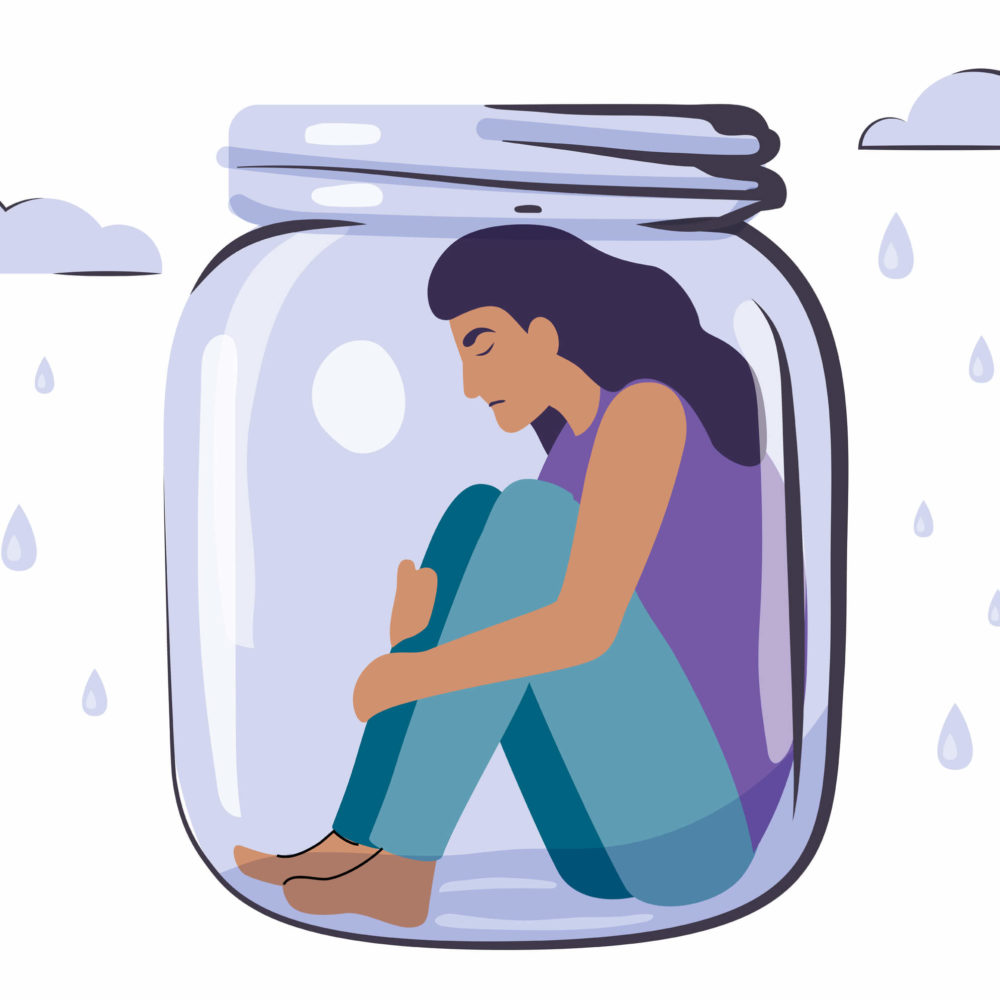5 Minute Read
Words by Kate Lucey
Share this article…

Right now there are around 8 million of us in the UK suffering with an anxiety disorder, and less than half will seek treatment.
So why are so many of us carrying on and pretending everything’s fine, when we feel like we’re crumbling inside.
You’re probably familiar with Generalised Anxiety Disorder (GAD), the ‘official’ anxiety diagnosis for those of us who feel anxious and worried every day about a wide range of things, rather than one specific problem. More and more of us are opening up about and seeking treatment, which is brilliant, but there’s a certain kind of anxiety that prefers to bury its head in the sand.
While it’s not an official medical diagnosis, High Functioning Anxiety does exist according to experts. Kate Oliver, Chartered Psychologist and author of ‘Rise and Shine – How to transform your life, morning by morning’ tells WYLDE MOON, “I was previously diagnosed with GAD – and would also definitely describe myself as having had High Functioning Anxiety for much of my life. Some people who experience anxiety symptoms (such as worry, overthinking and overanalysing, a need for perfectionism, inability to relax or fear of failure) describe themselves as being high-functioning.”
Somebody with high-functioning anxiety will appear totally calm and ‘together’ on the outside. They may even be someone people admire because they always have their sh*t together. However, inside is a different story of intrusive thoughts, catastrophising, intense worry and fear.
The term ‘high-functioning’ pops up here to describe people with significant anxiety who are outwardly ‘doing really well at life’ and not seen to be struggling at all – the perfect use for the metaphor of a duck gliding calmly across a river and seeming serene, while underwater its feet are paddling frantically and the hard work is hidden.
“Some people with high-functioning anxiety can be really good at hiding their symptoms from others and appear calm, confident and productive ‘high achievers’,” says Kate. “Up to a certain point, they may find that their anxiety drives them on to achieve more, rather than holding them back.”
“On the inside, however, they may feel scared or worried or have obsessive thoughts. They may overthink things and be unable to relax. Their anxiety symptoms may affect their appetite and sleep. This can contribute to a sense of ‘imposter syndrome’ and fear of being ‘found out’, adversely affect their wellbeing and over time lead to becoming burnt out.”
Some typical signs of high functioning anxiety include;
1. Always going the extra mile at work or in your personal life, because you’re so worried about failure.
2. Struggling to say no to invitations, tasks or challenges, because you’re too anxious about letting people down.
3. Waking up at stupid o’clock in the morning because your worries are intruding into your thoughts
4. Constantly feeling tired due to the mental exhaustion of a mind that never stops whirring and the energy it takes to power through the intense feelings of anxiety and ‘carry on’
People with High Functioning Anxiety can often look like over-achievers who are always succeeding in life, because they’re filled with so much dread and fear of something going wrong that they will overplan, over prepare, and over work in most areas of their lives. Once something has been completed or ticked off, the worries will just move on to something else, rather than dissolving in a cloud of success.
Gemma Perlin is a life and behavioural coach, who says she sees this happen a lot with her clients. “It is true that our anxiety can be a useful fuel in the fire to motivate promotions, exam results and glittering successes, but anxiety will stop you fully enjoying and connecting to your success,” she told WYLDE MOON.
“Some people with high-functioning anxiety can be really good at hiding their symptoms from others and appear calm”
“Sure, anxiety might have helped get you to where you are today, but is it really working for you? What is the cost of your anxiety to your levels of happiness and contentment? Is this a sustainable way to propel yourself forward into the future you really want to live?
“You can harness the power of this form of energy in a different way. There is nothing wrong with having a critic on our shoulder, but make sure it isn’t there all the time. A useful technique is to create a scheduled ‘worry time’. This is a boundaried time on a regular basis where you are allowed to worry as much as you want but within a specific time slot, and then stop. Make sure you have a fun activity planned that signifies the end of the worry period.”

Swallowing the anxious thoughts and ‘just battling through’ will end up in you making a habit of harmful behaviour. Women in particular are often conditioned to believe they should be ‘useful’, helpful and nurturing at all times, and then we can struggle putting boundaries in place and saying ‘no’ to people.
Gemma advises us all to “acknowledge that saying no to someone can ignite a fear in you of being difficult, but ask yourself, are you really being difficult, or is that just how you view yourself? Really challenge what saying no actually means. Be patient with this, you are unlearning and rewiring the way you perceive communication in a totally new way, but be consistent and see what actually happens when you say no to other people. If you can learn that other people are in charge of regulating their own feelings and responses, you might just find that your anxiety begins to gently fade away.”
Kate Oliver agrees, adding that “Experiencing some degree of nerves before an important event can certainly motivate us to prepare and put effort into doing well. However, prolonged stress and worry, without periods of respite, rest and relaxation is harmful to our bodies and minds.”
“High functioning anxiety can also lead to the person doing only the things they absolutely need to do to get by in life and work, and avoiding other experiences or opportunities that would lead to a more rich and fulfilling life. In this sense, we might say that they are ’surviving’ as opposed to ’thriving’. So over time, it is not only tiring, or even exhausting, but also unfulfilling.”
“Ultimately it’s for the individual to decide whether, on balance, their anxiety feels like something they are able to value and accept as part of them, and still enables them to lead a rich and meaningful life, or if the costs are starting to outweigh the benefits, drain and limit them.”
You might worry about letting people down or being a disappointment, but here’s the thing; we are not responsible for other people’s feelings or reactions. You cannot control them, and it’s not your job to make sure everyone else feels great all the time. Take care of yourself, first.
Share this article…





